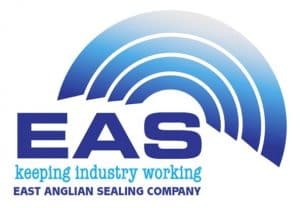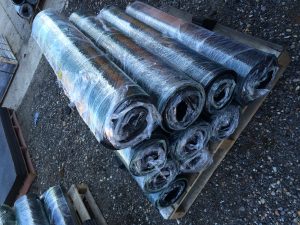EAS Ltd stocks a wide range of sheet and roll materials from many different Quality approved sources. Our roll form material is normally in 1mt, 1.2m, 1.4m, 1.5m or up to 2.4m wide x 5 or 10mt long depending on the thickness.
Thicknesses from 0.25mm to 25mm are available in roll form in the various grades listed below.
Moulded sheets are also produced in 500mm, 362mm or 300mm square sheets from 0.25mm upwards. Larger sheets at 1m x 2m are also stocked in the thicker economy grade materials.
Industrial Rubber Sheeting
All types of industrial rubber sheeting are available – for bulk orders manufactured especially, we are able to offer good discounts !
SBR Styrene Butadiene Rubber is a synthetic material typically used in vehicle tyres. In sheet form, this compound is often blended with other materials to give various properties such as abrasion resistance and weathering.
NR Natural Rubber is mostly derived from rubber trees in liquid latex form. Sheeting grades are available in it’s purest form ie Shotblast rubber or ‘Paranatural’ – with the highest possible abrasion resistance and wear properties. The material is often blended with SBR to produce ‘commercial’ quality economy grade sheeting for general purpose use.
CR Polychloroprene or ‘Neoprene‘ is a commonly used synthetic rubber with good oil and grease resistance coupled with good weathering properties. Used in its foam version for wet-suits, it’s often perceived to only be made in sponge form but is in fact a staple material in the gasket industry as a solid rubber. Economy grades are again made using SBR as a blending agent, while medium grades of material to BS2752 are available with an average 23% CR content. High content Neoprene sheeting is available, but is normally produced in moulded sheet format.
NBR Nitrile Butadiene Rubber is typically used for items such as automotive seals due to its good oil, fuel and grease resistance. The majority of O Rings used Worldwide are made in some form of NBR. Again, the material can be blended with SBR or CR to produce an economy grade sheet and medium content material to BS2751 is also stocked. High grade Nitrile of various hardness is available, mostly in moulded form.
EPDM Ethylene Propylene Diene Monomer synthetic rubber is best know for its excellent weathering properties being resistant to ozone and UV attack. The material is used widely in window seals and in vehicle seals that are not in contact with hydrocarbons. Sheeting in ‘commercial’ form along with higher grade UK WRAS approved material for potable water is stocked.
IIR Isobutylene Isoprene Rubber or ‘Butyl’ is another synthetic rubber developed for specific reasons. With a very particular molecular structure, this material is has very low permeability – even when stretched. This makes it perfect for reservoir linings, tubes for bike and vehicle tyres and gas diaphragms.
SI Silicone Rubber is stocked in various colours, hardness and grades – the most regularly used being FDA approved qualities. The material has an excellent temperature range (-60 to +200°C for standard material) but is not mechanically strong. It is identified as an Inorganic polymer without any Carbon atoms in its chemical structure – unlike most rubbers listed here. Using different curing agents, the material can be used for high temperature (300°C) fire resistance. It is also widely used for its electrical insulation properties and in food and drugs applications. Fluoro-Silicone is also offered for more critical applications.
Fluoro Rubbers
FKM Fluorine Rubber or Fluoroelastomer – generally known by its founding trade name of ‘Viton‘. This material has excellent resistance to heat, most chemicals, oils, greases and fuels. It is one of the most expensive and we will often revert to moulding parts to ensure minimal waste even for simple gaskets. Again, as with all the rubbers, standard quality material is stocked in roll form, while specialist grades are normally moulded in sheet form for specific applications.
FFKM Perfluoroelastomer is another fluorine based elastomer that exhibits maximum chemical resistance in any flexible polymer (it is often described as the elastomeric version of PTFE). While are able to supply this material in roll form, we normally offer smaller moulded sheets – or actually offer to mould the parts due to the high cost of the polymer.
HNBR Hydrogenated Nitrile Butadiene Rubber is a higher form of NBR offering its own unique properties with excellent resistance to steam, chemicals etc along with superb mechanical properties.
These are the basic rubber materials stocked at EAS, many variations and other materials are available, and we are able to make recommendations if you’re not sure which material is best for your particular application.
For our matting selection please refer to our sister company’s web site at www.horsemat.co.uk


